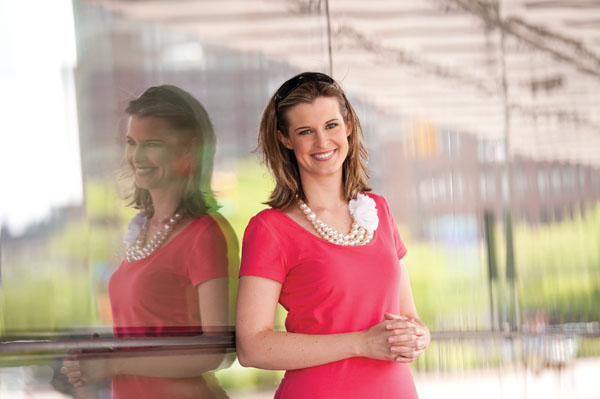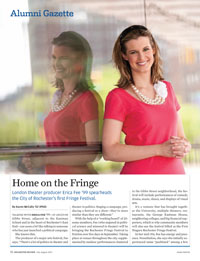Alumni Gazette
 STAND OR FALL: Fee says the fringe format invites experimentation and freedom—“a chance to succeed and a chance to fail,” for emerging artists and veterans alike. “That’s what sets it apart.” (Photo: Adam Fenster)
STAND OR FALL: Fee says the fringe format invites experimentation and freedom—“a chance to succeed and a chance to fail,” for emerging artists and veterans alike. “That’s what sets it apart.” (Photo: Adam Fenster)Talking with Erica Fee ’99—at Java’s on Gibbs Street, adjacent to the Eastman School and in the heart of Rochester’s East End—can seem a bit like talking to someone who has just launched a political campaign.
She knows this.
The producer of a major arts festival, Fee says, “There’s a lot of politics in theater and theater in politics. Staging a campaign, producing a festival or a show—they’re more similar than they are different.”
With the help of a “working board” of 20-some members, Fee (who majored in political science and minored in theater) will be bringing the Rochester Fringe Festival to fruition over five days in September. Taking place at venues throughout the city, supplemented by outdoor performances clustered in the Gibbs Street neighborhood, the festival will include performances of comedy, drama, music, dance, and displays of visual arts.
It’s a venture that has brought together the University, multiple theaters, restaurants, the George Eastman House, neighboring colleges, and big financial supporters, which is why community members will also see the festival billed as the First Niagara Rochester Fringe Festival.
In her mid-30s, Fee has energy and presence. Nonetheless, she says she initially experienced some “pushback” among a few members of the community who wondered about the new face—the woman from “out of town” who would be running the show.
Which is why Fee is quick to note that she is not, in fact, from out of town.
Raised in the nearby town of Victor, she traces her family’s roots in the area to the early 19th century. But for the past 11 years, she’s been making her way in the theater scene in London’s West End. It was in the UK that she became acquainted with fringe festivals—a unique kind of arts event with a storied history.
The first fringe festival took place in Edinburgh, Scotland, in 1947. Entirely unplanned, it was essentially a shadow festival to the much larger, grander Edinburgh International Festival, a juried festival in which multiple theater groups were not invited to participate. They held their own festival—performing at pubs and at rented space at the University of Edinburgh.
Today, the Edinburgh Fringe Festival, which remains unjuried, is the largest arts festival in the world and has spawned the new genre. In 2012, there will be approximately 200 fringe festivals around the world, with 20 in the United States.
“What’s exciting about a fringe festival is the structure,” says Fee. “Unlike a traditional performing arts festival, or even the jazz festival here, where there’s a central artistic board” she says, referring to the Xerox Rochester International Jazz Festival held in the city each June, “the venues all decide their own programming.” It’s a structure that allows risk taking by new artists or established talents, by up-and-coming venues, or long-standing community standard-bearers. “They’re really given a chance to succeed and a chance to fail,” she says.
Fee acquired her knowledge of fringe festivals on the job—as both a performer and a producer of shows in the flagship Edinburgh festival. After graduating from Rochester, Fee moved to London to study acting at Arts Educational Schools London, a nearly century-old school that counts among its graduates Julie Andrews and Jane Seymour. In 2001, she won a role in I Am Star Trek, a comedy by Rick Vorndran about the life of Star Trek creator Gene Roddenberry, as Roddenberry’s wife, Majel. It was that show that brought her to the Edinburgh Fringe.
“I just couldn’t believe how fantastic the Edinburgh Fringe was,” says Fee, who returned to London to continue to work with the producers of the show, the Skullduggery Theatre Company, who became her first mentors. By 2004, she was ensconced in London’s West End with a sole proprietorship, Erica Fee Productions, focused on bringing new works to stage. In 2006, she achieved another breakthrough when she won—for the first time—the Society of London Theatre’s prestigious honor for new producers, the Stage One Award. The award, which she won again in 2007, placed her in a course, gave her funding for productions, and put her and other award winners under the mentorship of veteran London producer Paul Elliott.
All of which meant that Fee’s credentials were irresistible when informal discussions began among community and University leaders about creating a Rochester performing arts festival. Among those participating in those conversations were Joel Seligman, University president, Douglas Lowry, the Joan and Martin Messinger Dean of the Eastman School, and Nigel Maister, director of the University’s International Theatre Program. Fee, who was visiting Rochester in the summer of 2009, attended a few meetings of the then infant effort at Maister’s suggestion.
“They started talking about the Edinburgh Fringe Festival and, of course, I had to open my fat mouth and say that I had a lot of experience with the Edinburgh Fringe,” Fee says, laughing.
By 2010, the momentum was gunning for a genuine “fringe,” and Fee had moved back to Rochester to spearhead the effort.
According to Maister, “there wasn’t a lot of focus” in the early discussions about a Rochester arts festival. “What Erica brought from her experience in the UK crucially helped define the kind of festival we would have. And that’s a major achievement.”
As for Erica Fee Productions of London, Fee says, “I’m not producing anything else right now because this is my morning, noon, and night. I still have my fingers in pies. I still have interests. But right now, all my focus is on the Rochester Fringe.”

